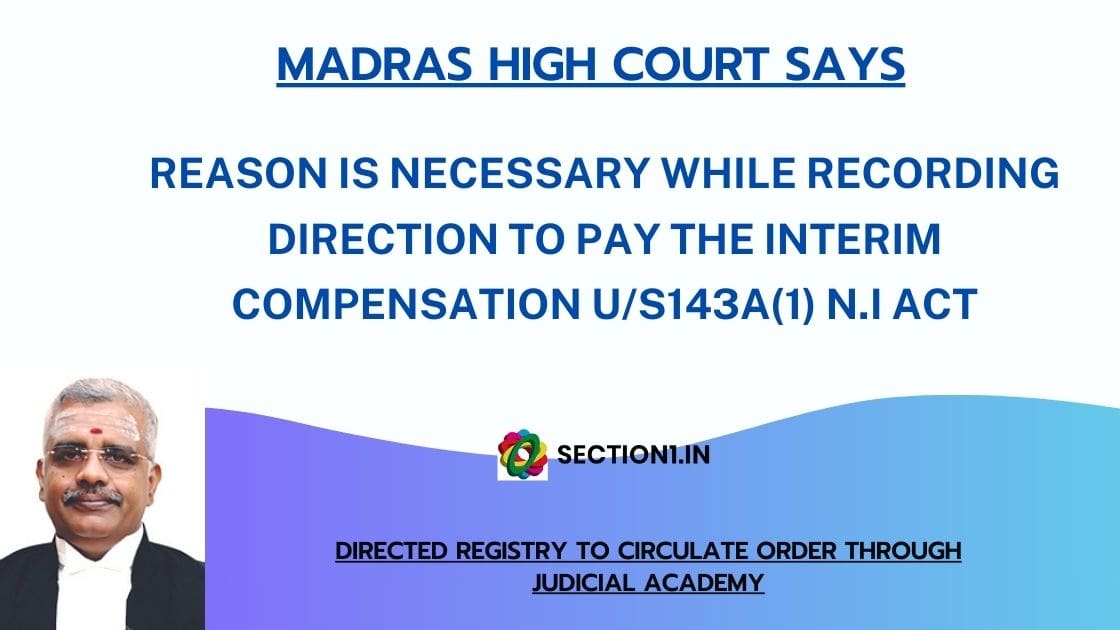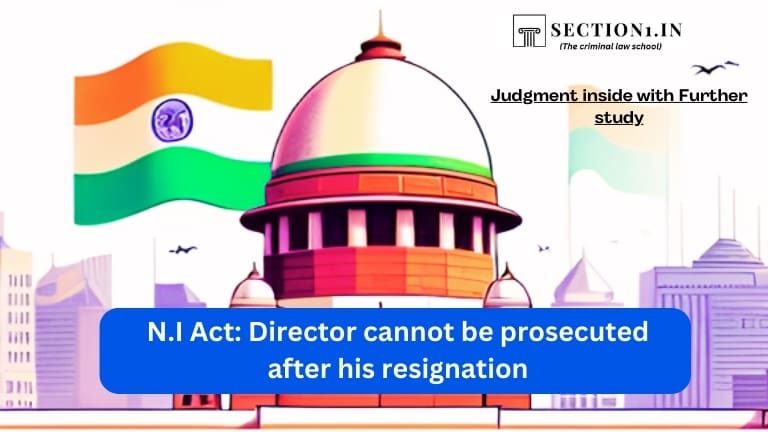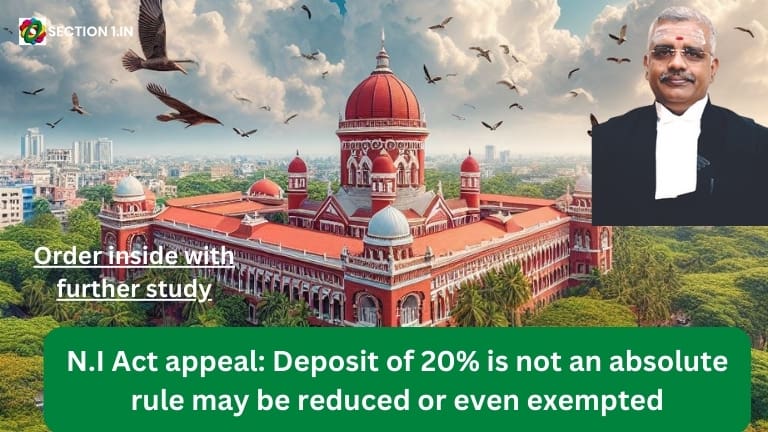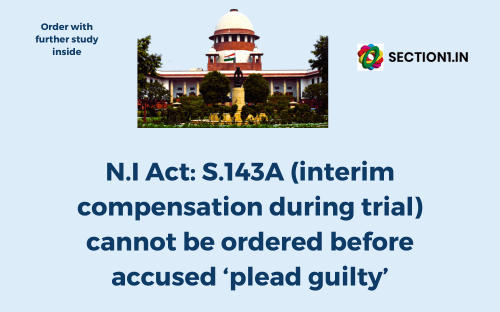In both these cases, the common issue that arises for consideration is regarding the scope and purport of Section 143A of the Negotiable Instruments Act.
HISTORY OF S.143-A N.I Act
2. Section 143-A of the Negotiable Instruments Act was inserted by Act 20 of 2018 and was brought into effect from 01.09.2018 onwards. It will be relevant to extract the reply given by the Minister of State in the Ministry of Finance, while replying to the parliament, on the debate that took place at the time of introduction of the Bill through which this amendment was brought in.
“THE MINISTER OF STATE IN THE MINISTRY OF FINANCE (SHRI SHIV PRATAP SHUKLA) replying to the discussion, said:
15 Members expressed their views on this Bill. Mostly everyone has said that earlier when cheques used ot bounce, then people used to fear. Now this will be reduced. At this time there are about 16 lakh cases of cheque bounce in the subordinate and district courts in the entire country and of these, about 32 thousand cases have gone upto the High Courts. This provision was made also to ensure that such cases do not go upto High Courts. An amendment has been brought in it so that not only the commercial transaction cases, but also the ordinary public benefit from it. People think about the bussinessmen that whatever they do will be correct. Yet, chequest are dishonoured. We will have to think that what should be done about it. By this on the one hand the businessmen will also be benefited as to how cheques can be believed and those people will also be benefited whose cases are related to cheques of small http://www.judis.nic.in amounts. Now the Government’s cheques will not 5 bounce. The form of Government Cheques is different, which has already been prescribed by the RBI. Many a times the mistakes are clerical and not because of Government’s mistakes. I a government the amount of many accounts get transferred from one scheme to the other. This Bill has been brought so that such situations do not emerge. I wish to say that you should definitely pass this Bill.”
3. Along with this amendment, Section 148 of the Negotiable Instruments Act was also brought into force which enabled the Appellate Court to insist for the deposit of 20% of the fine or compensation amount, awarded by the Trial Court against the accused person. The scope of this provision came up for consideration before the Hon’ble Supreme Court in Surinder Singh Deswal @ Col.S.S. Deswal and others Vs. Virender Gandhi in Criminal Appeal Nos: 917-944 of 2019.
SECTION 143-A AMENDMENT WILL BE APPLICABLE EVEN FOR PENDING PROCEEDINGS
4. The effect of Section 143-A of the Negotiable Instruments Act regarding its applicability to the pending cases, need not require a very detailed discussion and this Court can safely adopt the very same reasoning given by the Hon’ble Supreme Court in the above judgment. The amendment through which Section 143-A was brough into force will be applicable even into pending proceedings. If such a purposive interpretation is not given to this provision, it will defeat the very purpose of amendment which was brought in as a beneficial piece of legislation for the complainant prosecuting a criminal complaint under Section 138 of the Negotiable Instrument Act.
6. A reading of the above provision makes it clear that the Court trying an offence under Section 138 of the Negotiable Instruments Act “may” (emphasis supplied) order the drawer of the cheque to pay interim compensation to the complainant. The provision itself shows that the discretion is vested with the Trial Court to direct interim compensation to be paid by the complainant. It is not necessary that in all cases, the trial Court must necessarily direct the complainant to pay interim compensation and such a direction should be given only on a case to case basis, by taking into consideration the facts of each case. The legislature has intentionally not used the word “shall”, since it would have prevented the accused persons, even in genuine cases, from defending themselves without paying 20% as interim compensation amount to the complainant. This would have directly affected the fundamental right of an accused person to defend himself in a criminal case. This is the reason why the legislature had thoughtfully used the word “may” under Section 143A(1) of the Negotiable Instruments Act. Therefore, it is not possible to read the word “shall” into the word “may” which is used in the provision.
7. In view of the above finding, the word “may”, gives the discretion to the Trial Court to direct the accused to pay interim compensation to the complainant. The exercise of discretion must always be supported by reasons, failing which the exercise of discretion will become arbitrary.
REASON IS NECESSARY WHILE RECORDING DIRECTION TO PAY THE INTERIM COMPENSATION u/s143A(1)
8. Therefore, whenever the trial Court exercises its jurisdiction under Section 143A(1) of the Act, it shall record reasons as to why it directs the accused person (drawer of the cheque) to pay the interim compensation to the complainant. The reasons may be varied. For instance, the accused person would have absconded for a long time and thereby would have protracted the proceedings or the accused person would have intentionally evaded service for a long time and only after repeated attempts, appears before the Court, or the enforceable debt or liability in a case, is borne out by overwhelming materials which the accused person could not on the face of it deny or where the accused person accepts the debt or liability partly or where the accused person does not cross examine the witnesses and keeps on dragging with the proceedings by filing one petition after another or the accused person absconds and by virtue of a non-bailable warrant he is secured and brought before the Court after a long time or he files a recall non-bailable warrant petition after a long time and the Court while considering his petition for recalling the non-bailable warrant can invoke Section 143A(1) of the Act. This list is not exhaustive and it is more illustrative as to the various circumstances under which the trial Court will be justified in exercising its jurisdiction under Section 143A(1) of the Act, by directing the accused person to pay the interim compensation of 20% to the complainant.
xxx
19. This Court took the effort of discussing the effect and purport of Section 143A of the Negotiable Instruments Act, only to ensure that some guidelines are given to the Subordinate Courts, which deals with complaints under Section 138 of the Negotiable Instruments Act, on a regular basis to deal with such petitions effectively and in accordance with law.
REGISTRY IS DIRECTED TO CIRCULATE THE ORDER COPY TO ALL SUBORDINATE COURTS THROUGH JUDICIAL ACADEMY
20. In view of the above discussion, the order passed by the Court below in Crl.M.P.No.710 of 2019 and Crl.M.P.No.885 of 2019 dated 11.04.2019 is hereby setaside. In the result, the Criminal Original Petitions are allowed. There shall be a direction to the Court below to complete the proceedings in C.C.No.161 of 2018 and C.C.No.142 of 2018, within a period of three months from the date of receipt of a copy of this order. The Registry is directed to circulate a copy of this order to all the Subordinate Courts through the Judicial Academy. Consequently, connected miscellaneous petitions are closed.
PARTY: L.G.R.Enterprises, represented by its Propreitrix Sindu @ Lakshmi W/o.V.Mahadevan Iyer, Lingesh Flats, 14/35 F1, Srinivasa Iyer Street, West Mambalam (Near Indian Bank) Chennai-600 033 vs. P.Anbazhagan – Crl.O.P Nos: 15438 and 15440 of 2019 – 12.07.2019.
https://www.mhc.tn.gov.in/judis/index.php/casestatus/viewpdf/477219






